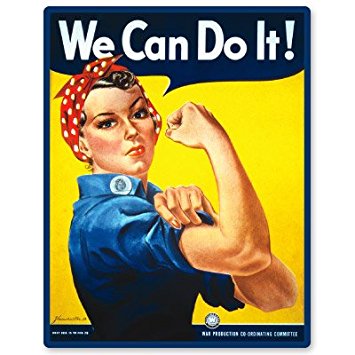America has made some progress toward equal rights and protections for women over the past hundred years or so.
The 19th Amendment (1920), the Equal Pay Act (1963), the Civil Rights Act (1964), Title IX (1972), the Violence Against Women Act (1994), and the first woman to secure the presidential nomination of a major political party (2016), are all testament to a nation plodding along, albeit slowly, toward gender equality.
But back in 2000, at the dawn of the new millennium, when my daughters were born, it was clear we still had a long way to go, so they were named for clever, strong, world-changing young women, whose footsteps they might follow.
Thomasina Coverly (Big Sis T) is the heroine of Tom Stoppard’s mind-bendingly clever play, Arcadia. A brilliant, rule-breaking girl generations ahead of her time, Thomasina lives in an early 19th century English manor visited by Lord Byron, theorizes the second law of thermodynamics (using rice pudding and jam) and muses on entropy and chaos theory, while learning to waltz for her 17th birthday party.
And Sarafina (Little Sis Z’s middle name) is the title character of a musical about a brave, exuberant, social justice-minded young girl leading a group of South African schoolchildren opposing Apartheid in the Soweto Uprising.
If being named for dynamos like these doesn’t inspire you to ignore societal norms and shatter glass ceilings, nothing will.
Growing up, Big Sis T and Little Sis Z were surrounded by books—like Matilda, Olivia, and The Princess Knight—with strong female characters; and they joined Girls, Inc., the national organization dedicated to “inspiring all girls to be strong, smart, and bold.”
In our house, we live as if every door is open for women and men alike, and there are no constraints on who or what you may become based on sex or gender.
But today, the Glenn Sisters, who are now both teenagers, are confronting a nation at a cultural crossroads.
Nearly a century after women’s suffrage; fifty years after the United States outlawed discrimination based on race, color, religion, sex, or national origin; and eleven months after our country’s first female presidential candidate won the popular vote but lost the election, progress toward women’s rights and protections often feels like it’s on the ropes.
Just in the past month:
Education Secretary Betsy DeVos announced that the federal government will no longer enforce 2011 Title IX guidelines on campus sexual assault, leaving many victims and victims’ rights advocates concerned that college campuses will become more dangerous, especially for female students.
The U.S. Department of Health and Human Services issued two rules rolling back a federal requirement that employers must include birth control coverage in their health insurance plans, leading the American Civil Liberties Union and women’s health groups across the country to immediately file lawsuits against the action.
And last week, after months of cascading revelations and accusations of harassment and assault on women by such powerful and high profile men as Bill Cosby, Bill O’Reilly, Roger Ailes, and Donald Trump, a scathing expose in the New York Times describing decades of aberrant behavior by Hollywood producer Harvey Weinstein shook the entertainment industry.
Prompted by the Weinstein scandal and fed up with the culture that allows this kind of behavior, actress Alyssa Milano launched a social media protest with the hash tag #MeToo, encouraging women who have been victims of harassment or assault to speak up and show how widespread sexism and misogyny really are.
Within a week, more than a million women (and men) tweeted their stories and support.
As the president of a college, I can’t help but note that if a student or staff member spoke or acted the way these men have allegedly behaved, and their behavior was confirmed, they would be expelled or fired, and perhaps prosecuted.
And as a father, I want tomorrow to be better, not worse, for my children (and yours, too).
As confusing and frustrating as all of this must be for young people, who may not know what, if anything, they can do to create change; our need for the next generation to do better than we have managed to do has never been greater.
So I was a very proud dad this week when the teenage heroines in my household each took a couple steps forward:
Middle school is tough on everyone, but especially young girls who face incredible pressure to look and act in particular ways. So Little Sis Z and some of her friends decided to create an empowering “judgment free zone” for young teens by plastering the walls of the girls’ bathroom with sticky notes that read “Believe in Yourself”, “Stay Strong”, “Beauty is on the Inside”, and “Sisters Today, Sisters Tomorrow.”
Mentors in Violence Prevention (MVP) is an international program, launched by Northeastern University’s Center for the Study of Sport in Society, that trains youth to help prevent bullying, sexual harassment, and gender violence. A few days ago, Thomasina and some of her fellow MVP facilitators travelled to Gillette Stadium to meet with Patriots owner Bob Kraft and Attorney General Maura Healey to discuss strategies for reducing gender violence in professional athletics.
And soon after that, the votes were tallied for the annual “superlatives” in Thomasina’s senior high school yearbook. Among other nominations, she was elected “Best Musician,” “Most Likely to Change the World,” and “Class Feminist.”
She was elated; then discovered that two senior boys were nearly tied in the race for “Class Chauvinist.”
Grass roots campaigner that she is, Thomasina canvassed some student opinion, got her facts in hand, and visited with the school’s MVP advisor and principal. Besides being an offensive term to women, Thomasina noted that calling a man a “chauvinist” is not the same as calling a woman (or anyone) a “feminist.”
A feminist, she pointed out, is someone who advocates for “the political, economic, and social equality of the sexes.” While a chauvinist is someone who expresses “excessive or blind patriotism” and “an attitude of superiority toward the opposite sex.”
That may be, she was told, but it was too late to change it—maybe next year.
Much like Thomasina Coverly dancing the waltz at her 17th birthday party nearly 200 years ago, equality for women, even in 2017, often takes one step up and two steps back.
But she’s out there on the dance floor, and Sarafina is not far behind…







